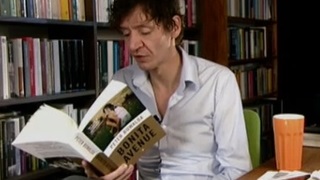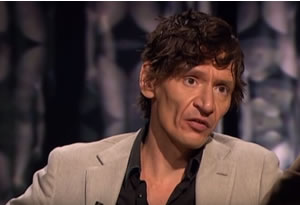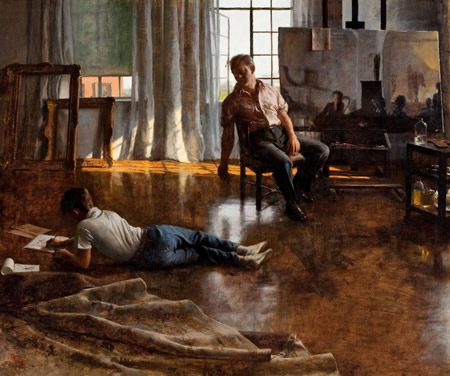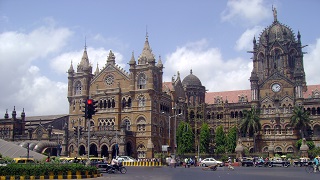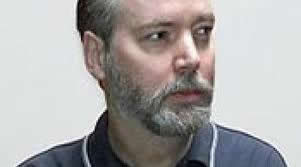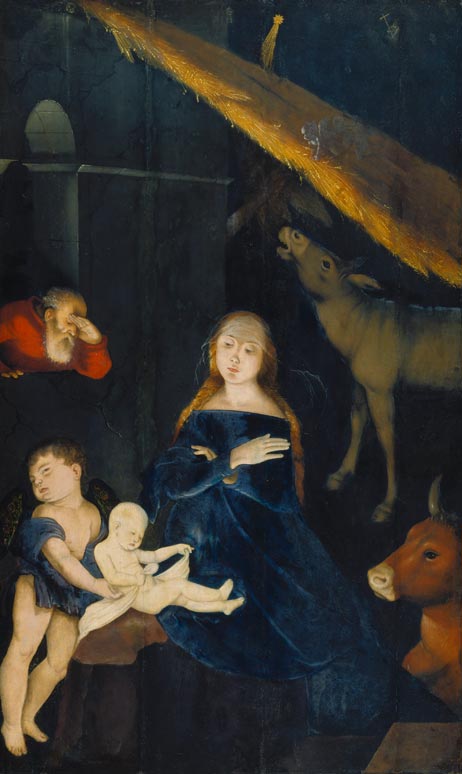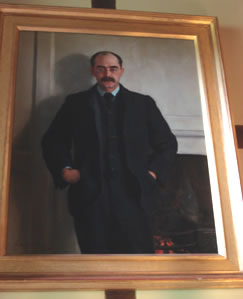De Nederlandse schrijver, journalist en redacteur Peter Buwalda werd geboren in Blerick op 30 december 1971. Zie ook alle tags voor Peter Buwalda op dit blog.
Uit: De kleine voeten van Lowell George (Bestekla)
“Vorige week wilde ik een column schrijven over de eerste werkdag, als fenomeen, maar ook de mens erachter. De methode-Geert Mak, kun je zeggen, waarbij je ogenschijnlijk ontspannen iets over de eerste werkdag van je schoonmaakster vertelt, maar eigenlijk de Grote Geschiedenis op het canvas van je column slingert. (Zie: Geert Mak, De eeuw van mijn hulp.)
Dus begon ik over Carmen, mijn eigen hulp, en haar eerste werkdag, met de bedoeling om van daaruit, als een raket die trappen afstoot, voort te spuiten naar andere, historische eerstewerkdagen.
Totaal mislukt. Die column ging alleen maar over stofzuigen en ramenlappen.
Terwijl er dus een hele aardige eerste werkdag in de startblokken stond, snuivend als een renpaardje, te weten die van Ingrid. Op haar eerste kantoordag haastte ik me de trappen af, ik werkte in die tijd nog als asbestspecialist bij Uitgeverij L.J. Veen, afdeling debuten. In mijn kielzog donderde het hele kantoorpand, al gauw een mannetje of vijftig, de receptie in, een onvertoonde kantoorstampede richting uitgang. In onze oren loeide de sirene die iedereen kende van de jaarlijkse brandoefening.
Nu was er geen oefening. Nu was er brand.
Achter de receptie zat Ingrid, andere Ingrid, moet ik zeggen, waarom iets helder navertellen als het ook troebel en mistig kan. Andere Ingrid was een echte Jordanese, in wier keukentje Maartje en Marie-Anne altijd koffie zetten. In zo’n grote kantoorkan, met een parasol als filter en een kilo Douwe Egberts. Ik kreeg klachten: zet ook eens koffie, lul de behanger.
Dus ik dacht: oké, ik zet ook eens koffie. Ik stond alweer een roman te puntlassen, toen Ingrid belde, de andere dus, de Jordanese. ‘Peterrrr…’ fleemde ze zangerig, ‘je koffie is klaarrrrr…! Hij ligt in de bestek- laaaa…!’
Ik erheen, jezus, wat nú weer – bleek ik vergeten de oude koffie uit die vijfliterkan te gieten. Alles overgelopen. De hele bestekla tot de rand vol met kokende koffie. Iemand een lepeltje?
Maar het gaat me om ándere andere Ingrid, je kunt wel zeggen de echte, want zij en ik kwamen nog samen te wonen, later. Nu zag ik haar voor het eerst, en ze bloosde. Niet vanwege mij, maar omdat ze op de alarmknop had gedrukt. Ze stond achter de receptie, even kletsen met andere ándere andere Ingrid, zo gaat dat op je eerste werkdag – je hebt nog niks te doen, je had net zo goed thuis kunnen blijven, maar ja, dan schuift alles op tot in de urn.”
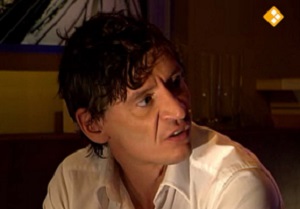
Peter Buwalda (Blerick, 30 december 1971)
De Duitse dichter en schrijver Theodor Fontane werd geboren in Neuruppin op 30 december 1819. Zie ook alle tags voor Theodor Fontane op dit blog.
Uit: Meine Kinderjahre
„Freilich, wenn ich, was möglich, es dieser Procedur verdanken sollte, daß ich immer noch einen bescheidenen Bestand von Haar habe, so habe ich nicht umsonst gelitten und bitte reumüthig ab. Neben dieser sorglichen Behandlung der Kopfhaut, stand eine gleich fürsorgliche Behandlung des Teint. Aber auch diese Fürsorge lief auf Anwendung zu scharf einschneidender Mittel hinaus. Wenn bei Ostwind oder starker Sonnenhitze die Haut aufsprang, hatte meine Mutter das unfehlbare Heilmittel der Citronenscheibe zur Hand. Es half auch immer. Aber Coldcream oder Aehnliches wäre mir doch lieber gewesen und hätt es wohl auch gethan. Uebrigens verfuhr die Mama mit gleicher Unerbittlichkeit gegen sich selbst und wer muthig in die Schlacht vorangeht, darf auch Nachfolge fordern.
Ich wurde, wie schon erwähnt, während der Zeit, wo wir die Miethswohnung inne hatten sieben Jahr alt, gerade alt genug, um allerlei zu behalten, weiß aber doch herzlich wenig aus jener Zeit. Nur zweier Ereignisse erinnere ich mich, wobei wahrscheinlich eine starke Farbenwirkung auf mein Auge, mein Gedächtniß unterstützte. Das eine dieser Ereignisse war ein großes Feuer, bei dem die vor dem Rheinsberger Thore gelegenen Scheunen abbrannten. Es war aber, wie ich gleich vorweg zu bemerken habe, nicht der Scheunenbrand selbst, der sich mir einprägte, sondern eine sich unmittelbar vor meinen Augen abspielende Scene, zu der das Feuer, dessen Schein ich nicht mal sah, nur die zufällige Veranlassung gab.“
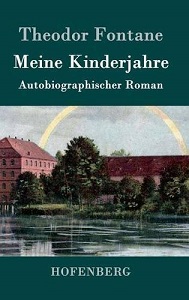
Theodor Fontane (30 december 1819 – 20 september 1898)
Cover
De Hongaarse schrijver en politicus Miklós Bánffy (graaf van Losoncz) werd geboren op 30 december 1873 in Kolozsvár, op dat moment gelegen in het koninkrijk Hongarije. Zie ook alle tags voor Miklós Bánffy op dit blog.
Uit: The Transylvanian Trilogy (Vertaald door Patrick Thursfield en Katalin Banffy-Jelen)
“That this agreement had been made was not, until now, public knowledge and indeed had been expressly denied during the summer when Laszlo Voros, Minister of the Economy in Fejervary’s so-called ‘Bodyguard’ government, had first announced the existence of the Pactum, the settlement of differences between the royal nominees and the elected representatives. These denials had then been in somewhat vague terms, but now the matter had been brought out into the open. The new government’s problem was how openly to face the situation provoked by the People’s Party representative, offer a solution that would content the opposition, and at the same time keep their word to the King.
Everyone’s face was saved by the intervention of Ferenc Kossuth, who boldly risked his reputation in the discussion in the committee when he declared that no Pactum existed since secret agreements of that sort were unconstitutional. This was a dangerous statement to make since everyone knew that for the King to have made the new appointments, agreement must have been reached on specific points such as this; but it sounded well and so dignity had been maintained by oratory. As a result it was planned that the House would reject the impeachment proposal and instead give its approval to an official statement which branded Fejervary and his cabinet as ‘disloyal counsellors of the King and nation’ and delivered them to the ‘scornful judgement of history’. It was further decided that this official statement should be everywhere displayed on posters.
The formula was a good one and all the committee members had left the meeting satisfied in their own ways; the radicals because the hated ‘Bodyguard’ government would be publicly degraded, and the new cabinet because they were no longer faced with a constitutional obligation to initiate an impeachment which would be most embarrassing to them.”
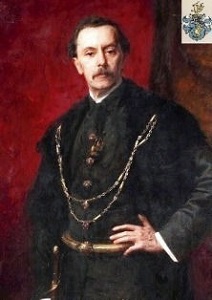
Miklós Bánffy (30 december 1873 – 5 juni 1950)
De Duitse schrijver en regisseur Peter Lund werd geboren op 30 december 1965 in Flensburg. Zie ook alle tags voor Peter Lund op dit blog.
Uit: Das Wunder von Neukölln
„Johannes:
Das sagst du. Deswegen arbeitest du ja auch bei der TAZ.
Dorothea:
Dafür bezahlen wir zweimal irn Jahr hundert Mark an die S.0.S.-Kinderdörfer und kaufen fußgemalte Postkarten. Mehr muß definitv nicht sein.
Johannes:
Aber-
Dorothea:
Wir haben nichts mit diesem Mädchen zu tun. Nichts!
Du weißt nicht einmal, woher sie deine Visitenkarte hat.
Johannes:
Vielleicht ist das ein Zeichen?
Dorothea:
Daß du dich nicht erinnerst, wo du sie angebaggert hast?
Johannes: ehrfürchtig
Ich fühle mich aufgefordert. Wir tun eh’ viel zu wenig.
Dorothea:
WIR?
Johannes:
Ich. Ich als Journalist hab immerhin einige Möglichkeiten.
Dorothea:sehr zuckersüß
Du könntest eine Spendenkampagne in’s Leben rufen.“
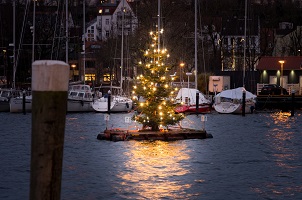
Peter Lund (Flensburg, 30 december 1965)
Flensburg in de kersttijd
De Amerikaanse dichter, schrijver en criticus Joshua Clover werd geboren op 30 december 1962 in Berkeley, California. Zie ook alle tags voor Joshua Clover op dit blog.
I want to read at the white house
I want to read at the white house.
I want to read poems at the white house.
I want to read poems at the white house with all the pomp available.
With celebratory music and all my beloveds watching.
With Baraka and DiPrima and Roque Dalton behind me
I want to read at the white house.
I want to read poems at the white house wearing my favorite clothes probably a hoodie or perhaps my Belgian suit.
Belgium is a failed state in the heart of Europe which is something to aspire to.
I like Belgium and one day I might like to read poems at the palace of the nation but for now I want to read poems at the white house.
I want to read poems and sing karaoke and I will probably tell a few nervous jokes.
It will be like all the other readings.
We will be there together.
I want to read poems at the white house and then like any house reading we will all clean up together.
We will clean up the mess we have made together.
All that rubble and all those ashes. These are my conditions.
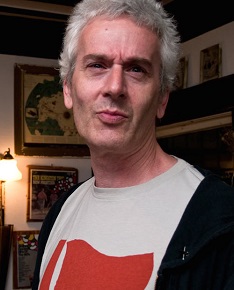
Joshua Clover (Berkeley, 30 december 1962)
De Amerikaanse schrijver, dichter en componist Paul Bowles werd geboren in New York op 30 december 1910. Zie ook alle tags voor Paul Bowles op dit blog.
Uit: Next to nothing: collected poems
Yes, I said we would need the machine-guns by next March,
but I also warned against saying life was easy.
I mixed hoops and coffins, cradles and needles
while the lights twinkled on far-off Monte Tomas.
We sat in a park that smelled of pine trees,
and that night there were voices in the corridors
and I remembered the empty face of the blind man as, he sang.
Tu misma tienes la culpa
de lo que has hecho conmigo.
You will find yourself among people.
There is no help for this
nor should you want it otherwise.
The passages where no one waits are dark
and hard to navigate.
The wet walls touch your shoulders on each side.
When the trees were there I cared that they were there.
And now they are gone, does it matter?
The passages where no one waits go on
and give no promise of an end.
You will find yourself among people,
Faces, clothing, teeth and hair
and words, and many words.
When there was life, I said that life was wrong.
What do I say now? You understand?
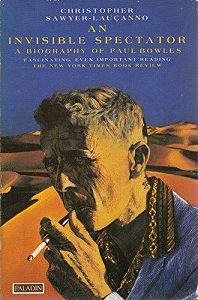
Paul Bowles (30 december 1910 – 18 november 1999)
Cover
De Britse schrijver en dichter Joseph Rudyard Kipling werd geboren op 30 december 1865 in Bombay, India. Zie ook alle tags voor Rudyard Kipling op dit blog.
The City of Sleep
Over the edge of the purple down,
Where the single lamplight gleams,
Know ye the road to the Merciful Town
That is hard by the Sea of Dreams –
Where the poor may lay their wrongs away,
And the sick may forget to weep?
But we – pity us! Oh, pity us!
We wakeful; ah, pity us! –
We must go back with Policeman Day –
Back from the City of Sleep!
Weary they turn from the scroll and crown,
Fetter and prayer and plough –
They that go up to the Merciful Town,
For her gates are closing now.
It is their right in the Baths of Night
Body and soul to steep,
But we – pity us! ah, pity us!
We wakeful; oh, pity us! –
We must go back with Policeman Day –
Back from the City of Sleep!
Over the edge of the purple down,
Ere the tender dreams begin,
Look – we may look – at the Merciful Town,
But we may not enter in!
Outcasts all, from her guarded wall
Back to our watch we creep:
We – pity us! ah, pity us!
We wakeful; ah, pity us! –
We that go back with Policeman Day –
Back from the City of Sleep!
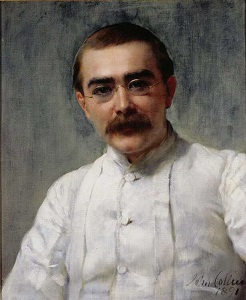
Rudyard Kipling (30 december 1865 –18 januari 1936)
Portret door John Collier, ca. 1891
De Canadese schrijver Douglas Coupland werd geboren op 30 december 1961 in een militaire kazerne in Rheinmünster-Söllingen in Duitsland. Zie ook alle tags voor Douglas Coupland op dit blog.
Uit: Worst. Person. Ever.
“Dear Reader . . .
Like you, I consider myself a reasonable enough citizen. You know: live life in moderation, enjoy the occasional YouTube clip of frolicking otters and kittens, perhaps overtip a waitress who goes to the trouble of tarting herself up a bit or maybe just make the effort to try to be nice to the poor—yay, poor people!
I suppose, in general, I enjoy traveling through life with a certain Jason Bourne–like dashingness. Oh, no! An assassin is rappelling down the side of the building, armed with a dozen box cutters! What are we going to do? It’s Raymond Gunt! We’re saved!
That’s my name, Raymond Gunt, and welcome to my world. I don’t know about you, but I believe that helping others is a way of helping yourself; what goes around comes around—karma and that sort of guff. So, seeing that I’m such a good soul and all, I really don’t know how to explain the most recent month of my life. There I was, at home in West London, just trying to live as best I could—karma, karma, karma, sunshine and lightness!— when, out of nowhere, the universe delivered unto me a searing-hot kebab of vasectomy leftovers drizzled in donkey jizz.
Whuzzat?! Hello, universe? It’s me, Raymond! What the fuck!
I am left, dear reader, with no other option than to believe that when my world turned to shit last month, it was not in fact me who had done anything wrong. Rather it was the universe, for I, Raymond Gunt, am a decent chap who always does the right thing.
And as I look back to try to figure out when the universe and I veered away from each other, I think it definitely had to be that ill-starred morning when I made the mistake of visiting my leathery cumdump of an ex-wife, Fiona.
Fi.
It was a blighted Wednesday off Charing Cross Road. After about fifty ignored e-mails, Fi deigned to allow me to come to her office, in a gleaming steel-and-limestone executive tombstone that straddles one of those tiny streets near Covent Garden. The building’s lobby was redeemed by being filled with heaps of that 1990s art about death and fucking—pickled goats, fried eggs and tampons—and there was a faint hissing sound as I passed through it and into the elevator, the sound of my soul being sucked out of me, ever so nicely, thank you.”
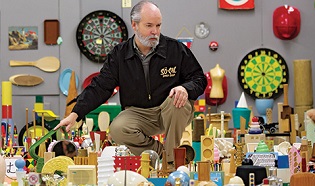
Douglas Coupland (Rheinmünster-Söllingen, 30 december 1961)
Zie voor nog meer schrijvers van de 30e december ook mijn vorige blog van vandaag.


